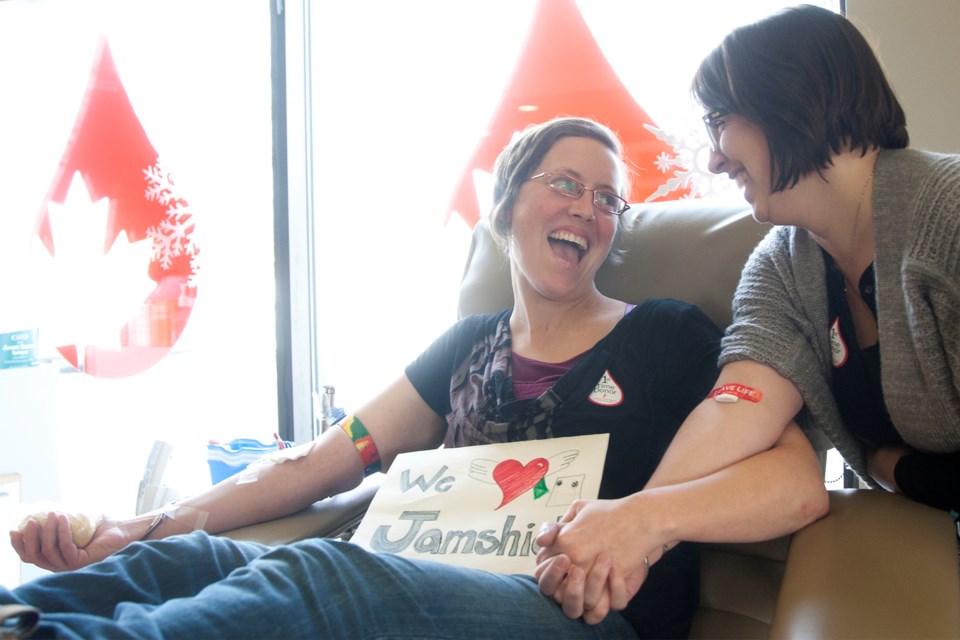Being poked by needles used to bother Christy Wilson, but after watching her infant son receive 10 blood transfusions she knows she can’t complain.
“My eight-month-old had to go through this every day for months, I think I can do it once every 56 days,” said Christy
Now a year-and-a-half old, her son Kai is six months post-treatment for hematoblastoma — a tumour on his liver.
Christy and her friend Josee Gratton, both teachers in Guelph, attended a blood drive recently at the local Canadian Blood Services location.
It was the first time either had donated.
“I have two kids. I was thinking about them, if they ever got sick I would hope people would help. This is a way I can help,” said Josee.
Christy isn’t sure most people understand the difference they make when they give blood, but she knows every person who does has their own reasons.
“Everyone has a story of why it’s so important to them — whether someone their family did growing up, or something that caused them to know how necessary it is to sustain life,” said Christy.
Aside from her own reasons to give, Christy was dedicating her first give to Jamshid — a six-year old boy from Hamilton, who died three weeks ago after a three-year battle with cancer.
Christy met Jamshid and his mother, Corinne Eiriksson, during a parent support group at the Pediatric Oncology Department at McMaster University’s Children’s Hospital.
Jamshid had been diagnosed with Stage 4 high-risk neuroblastoma in 2013, and received over 150 transfusions of blood products as a result.
Corinne says the transfusions not only prolonged Jamshid’s life, they contributed to a higher quality of life.
Treatment for neuroblastoma patients can include every type of cancer therapy - chemo, surgery, bone marrow transplant, radiation and immunotherapy.
Jamshid's funeral was held January 25, just three days before what would have been his seventh birthday.
Corinne asked friends and loved ones to donate blood in an effort to give back.
“He received so many transfusions that it would be difficult to give back all on my own. Even if I gave regularly it would take a very long time,” said Corinne.
Toward the end of his life, Jamshid would receive a transfusion of platelets every two to five days.
With only a five-day shelf life for the product, platelet donors have a special place in Corinne’s heart.
“They seem to be an interesting group that donate regularly. It’s their thing. They show up on time, because platelets don’t last very long,” said Corinne.
Although Jamshid received treatment at many hospitals, McMaster Children’s Hospital was his favourite.
![[object Object]](https://vmcdn.ca/f/files/guelphtoday/images/people/20160131-jamshid-mcmaster-submitted.JPG;w=400) Submitted photo of Jamshid in the McMaster University's Pediatric Oncology ward.
Submitted photo of Jamshid in the McMaster University's Pediatric Oncology ward.Jamshid was known around the ward, wearing the knight’s armour he received on a day trip to Medieval Times.
“It was a fun show. He did not like to eat very much — which is one of the typical things with neuroblastoma and chemo, they completely lose their appetite and things don’t taste good — but he ate that meal at Medieval Times with such relish, it was almost shocking to us. We were almost worried he was eating too much,” Corinne recalled.
To her, it symbolized how honourable her son was in the face of a terrible illness.
“I don’t think he was aware of the expectations of a knight to have honour, but he really did. He was always concerned about the happiness of the other kids in the clinic or on the ward,” said Corinne.
She said after the amount of time the family spent there, it was fitting Jamshid died at McMaster.
She asked for donations to the hospital in lieu of flowers for his funeral.
“We truly believe in our hearts that he passed away at home because we were there,” she said.
Corinne was touched by the blood-giving effort in memory of her son. She is aware of at least 10 people who gave blood on or around Jamshid's birthday, including Christy and Josee.
Michael Betel, director of donor relations for Canadian Blood Services, said most people associate giving blood with helping victims of car crashes.
“There are so many other reasons why hospitals and patients need blood,” said Betel.
The blood is collected and sent to one of the blood processing centres Canadian Blood Services oversees.
From there it is divided into three different products — red blood cells, plasma and platelets — then distributed.
Betel highlights the ongoing need for O negative blood donations, as it is used in emergency situations when blood type cannot be determined.
"Right now we have just about three days of inventory. We should have five to eight days," said Betel.
Up to 50 units of blood product could be required for a single car crash victim and up to eight units could be used per week from someone suffering from some forms of cancer.
During a February 1 blood drive in Guelph, only 18 units of blood were donated in total.
“I don’t like to blame people or communities. Let’s look forward,” said Betel.
Every 56 days — the amount of time required between donations — Christy and Josee plan to have breakfast, then donate together.
“It’s also something that isn’t difficult to do if you’re eligible. Your body can make it and barely even notices it’s gone,” said Christy.
